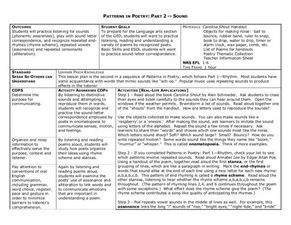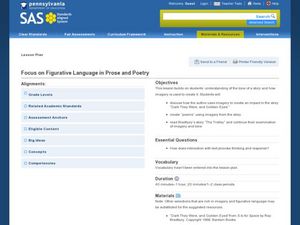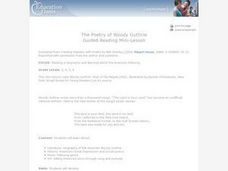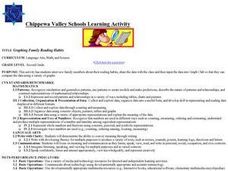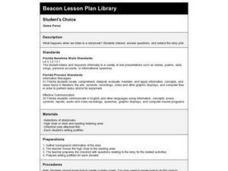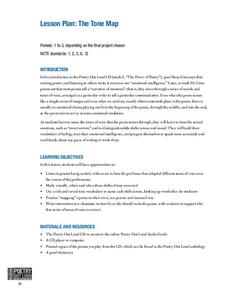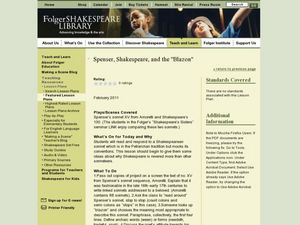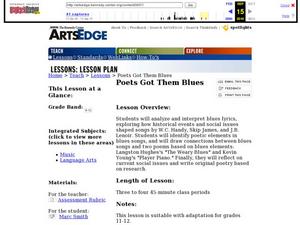Curated OER
Patterns in Poetry: Part 2 -- Sound
Students understand a variety of poems listening for sound letter correspondence, rhyme scheme, assonance, and alliteration. In this language arts instructional activity, students practice listening and reading skills to complete...
Curated OER
Listening for Tone
Students read and listen to various poems as they are read by different readers using different tones. They read "Jabberwocky" and in groups, determine what they think the nonsense words in the poem mean. The groups compare thier ideas...
Curated OER
Introducing Poetry
Students explore poetry. In this language arts lesson, students discuss the elements of poetry and students rewrite a lyric or poem.
Curated OER
Cinematic Poetry
Eighth graders explore the genre of poetry through the creation of a multimedia presentation. Students write a poem and create an Avid presentation of their poem for the class. The poems and presentations are peer-reviewed.
Curated OER
The Poetry of Langston Hughes
Students read aloud Langston Hughes poems. They select a poem and read aloud to music.
Curated OER
Poetry Describing Ordinary Life
Students examine the cultural and historical context which a poem is written in or describes. In this poetry lesson, students listen to an online recording of Philip Larkin reading "The Whitsun Wedding." Students explore how the poem...
Curated OER
THE FLOW OF MUSIC AND POETRY
Students explore their feelings about rain through art, music, and poetry. They listen to music as they think about rain and determine how they feel about rain. Students create either poetry or artwork about as they listen to music...
Curated OER
Nature Walk Poem
Third graders read poetry inspired by nature. They talk a walk in nature or in their neighborhood with paper and pen and write down feelings and perceptions. They write a poem about their walk and share it with the class.
Curated OER
Poetry: Serve Warmly and More Often
Students identify the mood and theme associated with the language of poetry. They discuss personal interpretation in small groups, and as a class and * experiment with language and rhythm.
Curated OER
Focus on Figurative Language in Prose and Poetry
Students place emphasis on the use of figurative language when analyzing prose and poetry. In this figurative language lesson, students explore the tone of a story and its imagery. Students read and discuss how the author uses imagery in...
Curated OER
The Poetry of Woody Guthrie
Students develop oral fluency through reading and singing. They sing "This Land is Your Land" and discuss what the pictures and words mean in the song. They connect the song and poem and previous learning and write a journal.
Curated OER
Seeing What You Read
Students practice visualizing what they read and hear in a text. They listen to selected passages from a text read by the instructor. Students discuss the visual pictures they see when listening to the text. After listening to a...
Curated OER
Graphing Family Reading Habits
Second graders collect data from their families about their reading habits and graph them. In this graphing family reading habits instructional activity, 2nd graders interview family members about their reading habits. They then use a...
Curated OER
Regents High School Examination Comprehensive Examination in English Session Two (2010)
In this Regents High School Examination Comprehensive Examination in English worksheet, students read passages from a memoir and a poem and answer comprehension questions. Students then write a unified essay based on both passages.
Curated OER
Picture It!
Students, through teacher modeling and guided practice, explore the concept of visualization and how it works to help them comprehend what they read. They read a story, visualize what has happened in the story, and then draw a picture...
University of Arizona
Yoruba Legends: Southern Nigeria
Explore legends and storytelling with your learners. After listening to some legends, pupils work collaboratively and then individually to come up with original legends about animals.
Curated OER
STUDENT'S CHOICE
Students interact, answer questions, and extend the story plot. They write a Haiku or basic poetry with their words, name characters, create a new ending for a story, and write a new story with one of the characters.
Curated OER
The Tone Map
Students listen carefully to a portion of the Poetry Out Loud CD. They focus on the tones the poet uses in his recitation of a poem. Then they map a poem of their own so that a classmate can read it using the tonal qualities intended...
Curated OER
Author's Voice in Passage
Learners explore author's voice. In this literary elements and reading comprehension lesson, students listen to two poems about snakes (included) and identify adjectives and other descriptive words and phrases that help them determine...
Curated OER
Poetry Genre Focus Lesson
Students explore poetry by listening to readings, identifying and understanding the elements of poetry, as well as the types of poetry. Students respond to poetry through discussions and writing their own poem.
Curated OER
Spenser, Shakespeare, and the "Blazon": Lesson 4
Students discuss the meaning and tone of Shakespeare's Sonnet 130. In this sonnets lesson, students compare Spenser's sonnets to Shakespeare's. Students discuss specific words that add to the humor in Shakespeare's sonnet,...
Curated OER
Poets Got Them Blues
Contemplate what music learners listen to and why they listen. Can they find poetry within music lyrics? Specifically hone in on blues lyrics and ruminate upon the social issues prevalent in the themes. Particular song lyrics coincide...
Curated OER
Letters From Rifka
Small groups read assigned chapters from the book, Letters to Rifka, then work together to fill out comprehension worksheets associated with their chapters. This fine, 13-page lesson culminates with each group getting together to meet...
Curated OER
You Too Can Haiku
Students conduct Internet research and explain the history of Haiku. After listening and reading various examples of Haiku, students use their own vocabulary and practice their math skills to determine the correct number of syllables...
